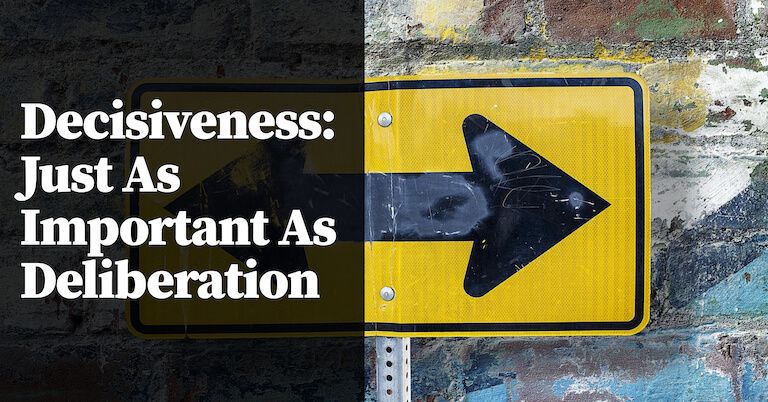
Hey Friend,
Decision-making frameworks do not take into account the cognitive biases and cost of analysis. In fact, decisiveness is an orthogonal factor when it comes to assessing the overall decision quality:
Decisions in the real world are often time sensitive — the sooner you act, the more value you realise from having acted (but often the precise amount of that value is also occluded by uncertainty).
Most decision-making frameworks don’t take time selection into account, since there is no need to model time sensitivity in decision experiments.
But in the real world, the utility of each choice may sometimes depend on the decisiveness with which you act on your analysis.
In other words, how quickly you act after coming to a decision is just as important as how you come to said decision.
The Costs of Acting Slowly
There are times when we are asked: “Why did you take so long to act? and we reply saying that “I think I knew there was a problem. The evidence was pretty clear but I just didn’t want to do it.”
One of the lessons you learn in management is that organisational problems become more intractable the longer they remain unsolved. You start by not firing one likeable under-performer, and then before too long, you have a culture of underperformance that permeates your entire org. Eventually, the competent people quit — they don’t enjoy the extra work. Those who aren’t as competent stay. Your company remains unquestionably likeable. But correcting the culture now becomes a lot more difficult than if you corrected it in the early days.
We do sometimes communicate ideas that performance didn’t matter as much as likeability. It’s important that everyone pulls their weight in a teamwork.
In theory, the most difficult challenge in decision making is making the right decision.
In practice, I’ve found that the most difficult challenge in decision making is executing a decision you do not want to do. This includes things like firing someone, quitting your job, or laying off a quarter of your company. It includes breaking up with your partner when the relationship doesn’t seem to be working out.
Being effective calls for us to act decisively on decisions that we do not like. This is common sense. And yet it remains amongst the hardest things we do.
Frameworks Can’t Explain It All
There is a popular belief that ‘rationality, and mental models, and decision-making frameworks are all you need to achieve your goals and become effective. This is partially true. Effective individuals have slightly better decision making methods in their heads, and they use thinking tools that are more effective at getting to their goals. But these tools aren’t enough to explain their effectiveness.
Sometimes, a simpler explanation is better. We don’t talk about decisiveness or about taking action as much because it’s so obvious, and because there’s nothing systematic about it that we can discuss. You just have to do things. That’s easy to say, but it’s difficult to pull off.
Effective individuals are usually effective because they are biased towards action.
We ignore this truth at our peril.
The next time you’re facing a difficult decision, you may use whatever decision-making framework you like. But you should probably keep in mind the idea that the more time you spend thinking, the higher the costs you pay. As psychologist Jonathan Baron says: “thinking is negative utility!” which is a fancy way of saying: “decisiveness is important“. But then again, you probably already knew that anyway.
Do follow the ‘JOE’s Life Skills Lab‘ and get yourself enrolled in my E-Mail Newsletter “SUNDAY RETAZOS” sent exclusively to my subscribers with weekly updates on ‘Mindful Productivity, life lessons and interesting articles I discover during the Week‘. I AM SURE YOU DO NOT LIKE TO MISS OUT ON THIS.
Get in touch… — JOE’s LIFE SKILLS LAB/Joe Sehrawat
Take Care
JOE
Photo by Mark Fletcher-Brown on Unsplash


